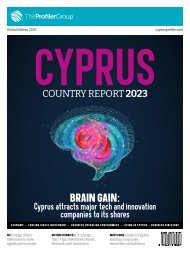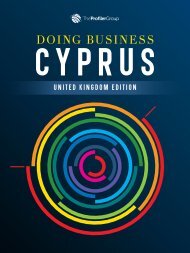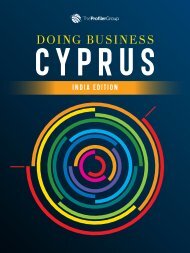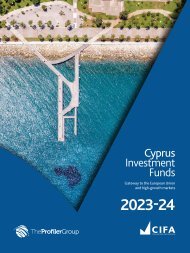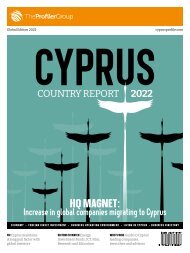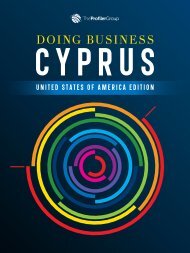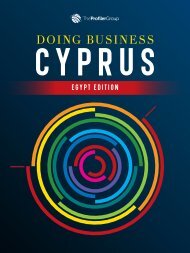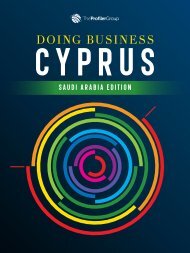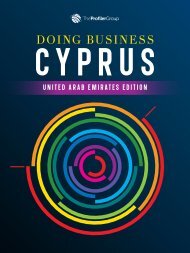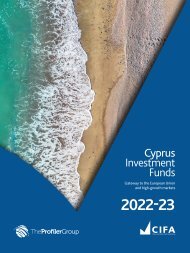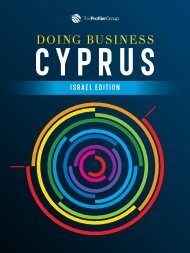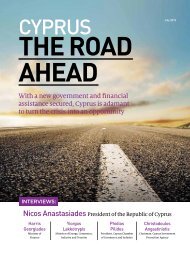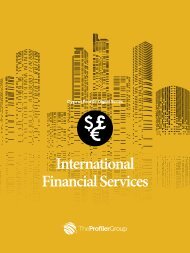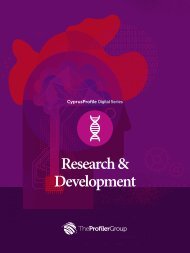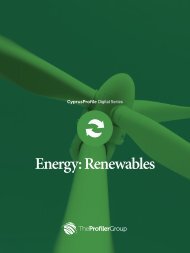2020 Cyprus Country Report
The 2020 Cyprus Country Report features in-depth articles on the economy, foreign direct investment, international trade and headquartering as well as detailed sector profiles and insights from Cyprus’ 100 most influential political, economic and business leaders shaping the future of their country and its industries.
The 2020 Cyprus Country Report features in-depth articles on the economy, foreign direct investment, international trade and headquartering as well as detailed sector profiles and insights from Cyprus’ 100 most influential political, economic and business leaders shaping the future of their country and its industries.
You also want an ePaper? Increase the reach of your titles
YUMPU automatically turns print PDFs into web optimized ePapers that Google loves.
Research & Development<br />
Sector Profile<br />
Prominent<br />
R&D Projects<br />
KIOS DRIVING ICT INNOVATION<br />
One of the island’s biggest ongoing research<br />
projects involves the University of <strong>Cyprus</strong>’ KIOS<br />
Research and Innovation Centre of Excellence (KIOS CoE).<br />
In collaboration with Imperial College, London, it conducts<br />
cutting-edge multidisciplinary research and innovation in the<br />
area of Information and Communication Technologies (ICT) with<br />
emphasis on the monitoring, control, security and management of<br />
critical infrastructure systems. In 2019, the Centre was awarded three<br />
new EU-funded projects to address key research challenges related to<br />
cancer monitoring and therapy, security of health data, and border surveillance<br />
with technologies such as unmanned aircraft systems. New technology and<br />
pioneering methods will be developed and are expected to have significant<br />
economic and social impact in the region and globally. To ensure<br />
that its research has maximal applicability and impact, KIOS<br />
collaborates with a large network of national and international<br />
academic, industrial, and governmental organisations.<br />
KIOS also has an innovation hub to promote technology<br />
transfer and liaisons with industry, as well as an<br />
entrepreneurship network to facilitate startups<br />
and venture capital investments.<br />
CONSERVING HERITAGE ASSETS<br />
The <strong>Cyprus</strong> Institute’s Science and Technology in<br />
Archaeology and Culture Research Center (STARC)<br />
brings together researchers from a broad range of<br />
subjects, including art history and archaeology, computer<br />
science, chemistry and physics, to preserve and understand<br />
cultural heritage. STARC employs bio-chemical-physical techniques<br />
to analyse works of art, ancient artefacts and archaeological discoveries.<br />
It has also led the way in the 3D documentation of heritage assets and the<br />
development of digital libraries. The STARC team from <strong>Cyprus</strong> collaborated<br />
with the Antiquities Department of Israel on a 3D mapping project of<br />
the Cenacle in Jerusalem, the building that is believed to be the site<br />
of the Last Supper. Thanks to laser technology and advanced<br />
photographic techniques, the precise dimensions of the<br />
room and its architectural chronology could be carefully<br />
mapped, providing conservationists with invaluable<br />
insights into how the structure should be preserved.<br />
This technology, pioneered and developed in<br />
<strong>Cyprus</strong>, can be exported worldwide and<br />
map and record historical and cultural<br />
landmarks across the globe.<br />
BIOBANK FOR VITAL RESEARCH<br />
Another Cypriot centre of excellence to benefit from Horizon <strong>2020</strong> funding is the<br />
national biobank, a collection of medical records and biological material, including<br />
blood, DNA/RNA, plasma, serum, urine, tissue biopsies and genetic samples to<br />
support biomedical research. This builds on work begun in 2010 by the Molecular<br />
Medicine’s Research Centre (MMRC), under the auspices of the University<br />
of <strong>Cyprus</strong>, which established a small biobank of genetic material related<br />
to the study of hereditary kidney disease. This expanded repository<br />
will ultimately accommodate a vast collection of genetic samples<br />
from hundreds of thousands of individuals. The existence<br />
of a unique national biomedical resource on this scale<br />
will attract a critical mass of medical scientists and<br />
experts, keen to utilise the biobank’s genetic<br />
material for the development of their own<br />
cutting-edge research and innovation.<br />
MARITIME RESEARCH<br />
<strong>Cyprus</strong> is one of the most influential shipping hubs<br />
in the world and in 2019 created the <strong>Cyprus</strong> Marine and<br />
Maritime Institute (CMMI), thanks to European Commission<br />
Horizon <strong>2020</strong> Programme funding. Focusing on key priority<br />
sectors such as maritime transport, offshore energy, maritime<br />
and coastal tourism and aquaculture, the CMMI is forging partnering<br />
relationships with well-known European institutions and businesses, active<br />
in the fields of research, technology and innovation for the Blue Economy, thus<br />
contributing to the transfer of knowledge and the development of a critical mass<br />
of infrastructure and human capital in the Eastern Mediterranean region. In <strong>2020</strong>,<br />
<strong>Cyprus</strong> took the lead in optimised shipping and port operations through an agreement<br />
between CMMI and two digital solutions companies, Tototheo Maritime and Marine Fields<br />
Holdings. This agreement will test the understanding that ship port calls and harbour<br />
services can be optimised through data sharing, using artificial intelligence (AI) and<br />
more efficient communications within the coastal ecosystem. In addition, the<br />
Institute also signed an MoU with Bernhard Schulte Shipmanagement to<br />
launch True North 72, an initiative that aims to encourage innovation across<br />
the maritime supply chain and logistics industries. In the education<br />
sector, Frederick University, based in Nicosia and Limassol,<br />
aims to become one of the world’s top providers of maritime<br />
education. In 2019 alone, the University had a budget of<br />
more than €28 million for 31 new research programmes,<br />
while in the past decade the university has been<br />
involved in over 200 research programmes.<br />
RISE OF EMERGING TECH<br />
A new kind of highly accessible research centre<br />
that aims to have a permanent and pivotal presence<br />
in the research and innovation ecosystem of <strong>Cyprus</strong> was<br />
established in 2017. Situated in the centre of old Nicosia, RISE<br />
(Research into Interactive Media, Smart Systems and Emerging<br />
Technologies) is an incubator and accelerator for both start-ups and<br />
established companies, with common working spaces and laboratories<br />
where innovative ideas can be tested. It is also a place for students and<br />
academics to develop their research in a user-friendly direction. The project is<br />
a joint venture between <strong>Cyprus</strong>’ three public universities and the municipality of<br />
Nicosia, along with the German Max Planck Institute for Informatics in Saarbrucken and<br />
University College London. RISE builds creative partnerships between local government,<br />
commerce and academic scientific research. The project has been very successful in<br />
competing for funds, so far securing €50 million, with €15 million from Horizon<br />
<strong>2020</strong> – a figure matched by the <strong>Cyprus</strong> government that will be scheduled over<br />
15 years, and with PwC and Eurobank offering their services in kind.<br />
124 <strong>Country</strong> <strong>Report</strong> CYPRUS <strong>2020</strong>



